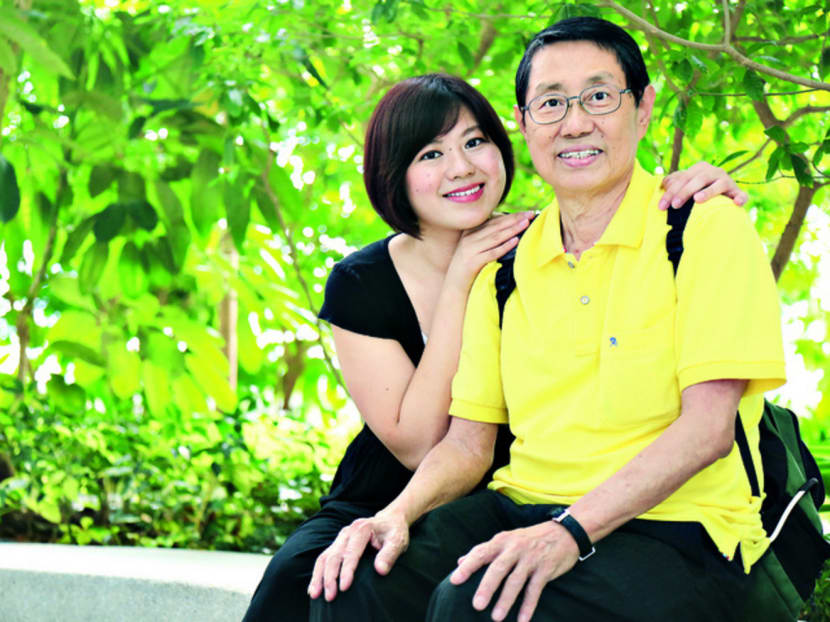Number of younger caregivers on rise
SINGAPORE — While her peers were climbing the corporate ladder, Ms Choy Wen Hui quit her job in the public service sector two years ago — at the age of 27 — to become a full-time caregiver to her father, Mr Choy Kam Seng.

Ms Choy Wen Hui quit her job two years ago to take care of her father, Mr Choy Kam Seng, who has a heart condition. Photo: KOH MUI FONG
SINGAPORE — While her peers were climbing the corporate ladder, Ms Choy Wen Hui quit her job in the public service sector two years ago — at the age of 27 — to become a full-time caregiver to her father, Mr Choy Kam Seng.
By then, Mr Choy’s heart problems, which he had been grappling with for over a decade, had taken a turn for the worse; his heart was failing.
“The doctors said my father only had one to two years to live. It was a huge shock to us. My dad is not an expressive person, but I remember him asking me to spend more time with him at one point,” said Ms Choy.
Other factors also influenced Ms Choy’s decision. The long years of caregiving had taken its toll on her mother. In addition, her 36-year-old brother, who works as a wealth management advisor, was able to shoulder the family’s finances.
caring for the elderly
The number of family caregivers such as Ms Choy is likely to increase as Singapore’s population ages.
The 29-year-old is one of the nine caregivers who were presented with the Singapore Health Inspirational Patient and Caregiver Award 2015 last week. The award recognises caregivers and patients who have displayed courage and resilience in the face of adversity.
A local survey found that the majority of caregiving responsibilities are shouldered by the children of care recipients, said Ms Jasmine Wong, senior social worker at Hua Mei Home Care, Tsao Foundation.
Even so, young adults such as Ms Choy are the minority rather than the norm.
Caregiver support services estimated that adults below the age of 40 make up less than 10 per cent of the family caregivers they see at their centres.
The average age of a typical local caregiver is between 40 and 60 years, said Mr Kavin Seow, director of TOUCH Community Services’ Caregivers Support service.
However, he expects more family members to become caregivers at a younger age as the population ages.
struggles of A
YOUNG CAREGIVER
Ms Wong said a caregiver’s journey can be physically, emotionally and financially daunting, regardless of age.
On the other hand, Mr Seow said, younger caregivers face different issues. “Young caregivers, who are at the prime of their lives, may have to give up or delay their career aspirations or their plan to start a family. With Singapore families getting smaller, households with fewer siblings will also have fewer family members to share the load of caring for an elderly person,” he said.
Shortly after Ms Choy stopped working, her father underwent a successful procedure to implant a left ventricular assist device (LVAD) implant — an artificial pump to relieve symptoms and prolong his life.
During that time, Ms Choy spent long hours in the hospital, taking care of her father’s daily needs and learning to dress his LVAD site wound.
While the physical demands of looking after her father were manageable, Ms Choy found the mental and emotional aspects especially taxing.
“Seeing my dad go through so much suffering and my mum’s emotions was stressful. I wasn’t prepared for that. It seemed as if I was slowly taking over the role of the parent,” said Ms Choy.
SELF-CARE IS IMPORTANT TOO
As she immersed herself wholly in her new role, Ms Choy occasionally struggled with caregiver burnout.
“There were days I felt really down but I would distract myself with activities like catching up with friends over the phone or having short dinners with them. I told myself I had to step up for my parents’ sake,” she said.
For caregivers, prioritising self-care is important to prevent burnout and fatigue, said Ms Wong. This is even more important for young and inexperienced caregivers, who might have high expectations of being “the perfect caregiver”, said Mr Seow.
He encouraged caregivers to build a tag team with other family members and support services, so that they can have pockets of time for rest.
“Caregivers should also maintain a healthy social network of friends who can talk about other things in life or participate in activities to take a break,” said Mr Seow.
The worst part of Mr Choy’s illness is now over. He is able to walk short distances and carry out most of his daily routine on his own.
Ms Choy’s full-time caregiving journey has also come to an end. She has started a new job at an events company, but she still helps her father to clean his LVAD wound daily.
“Becoming a full-time caregiver wasn’t a sacrifice but an adjustment. I’m glad that I was able to be with my dad when he needed me the most,” said Ms Choy.
When asked what got her through the past two years, Ms Choy replied: “A positive attitude.”
CORRECTION: In the report, we said that 29-year-old Choy Wen Hui was one of 11 caregivers presented with the Singapore Health Inspirational Patient and Caregiver Award 2015. This is wrong. Nine caregivers were given the award. We apologise for the error.





